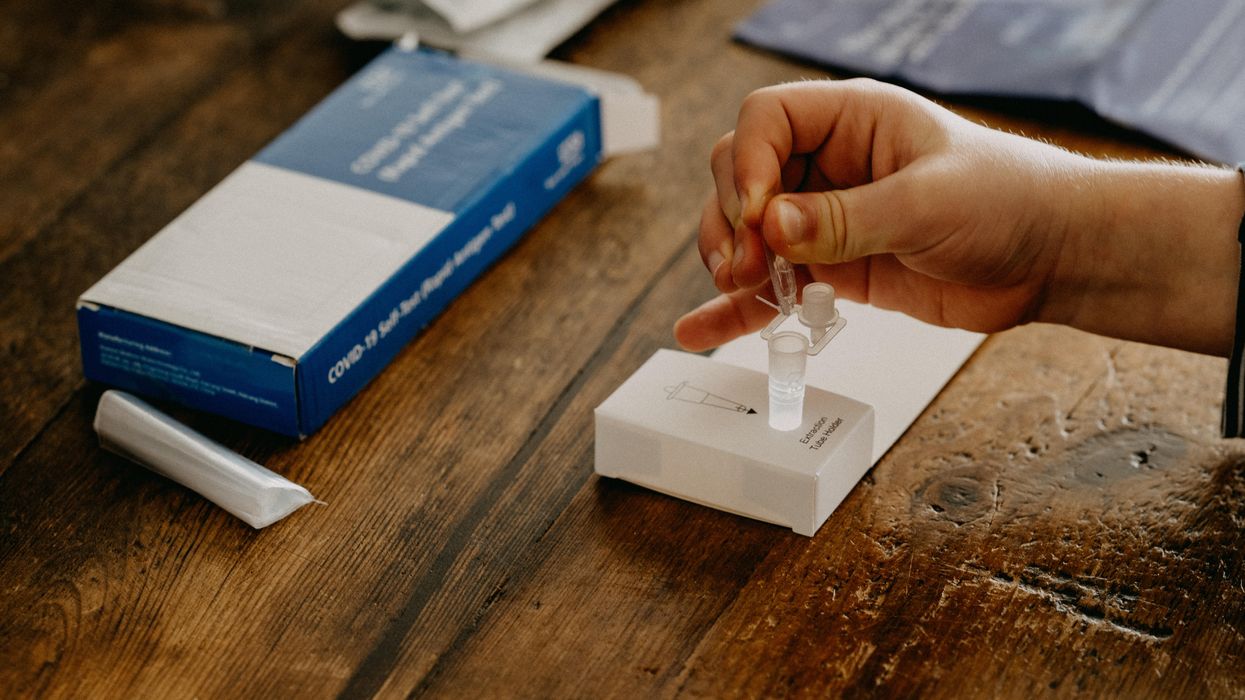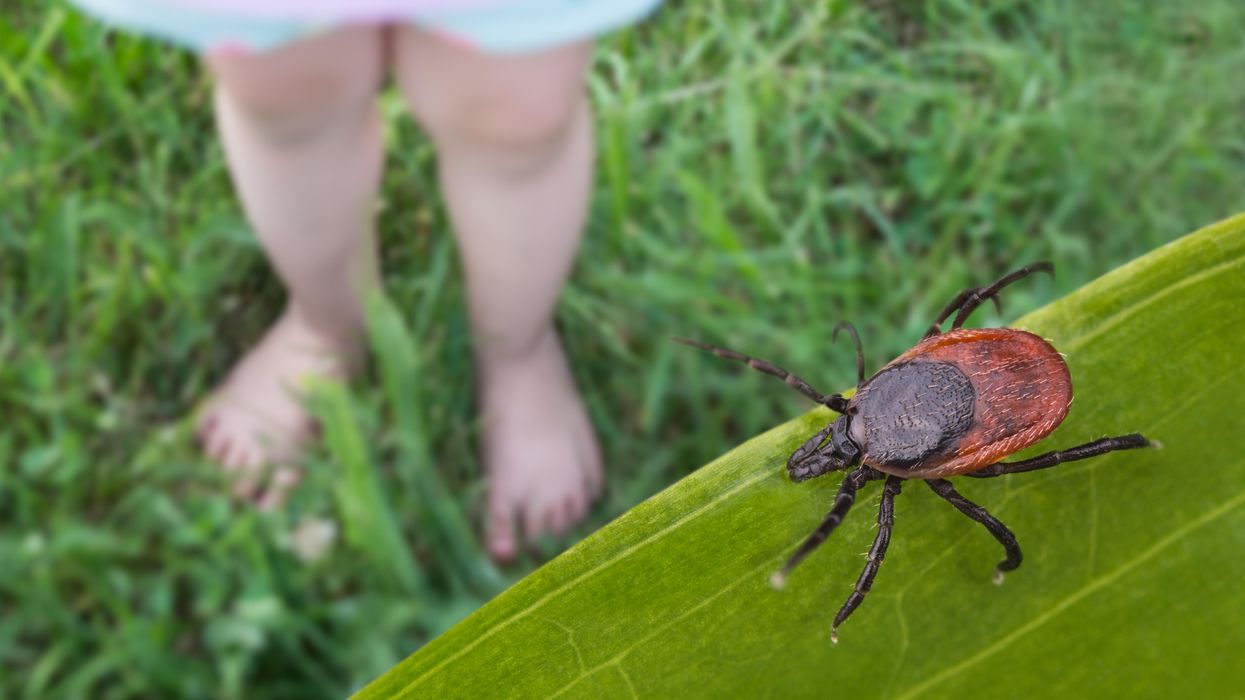Biohackers Made a Cheap and Effective Home Covid Test -- But No One Is Allowed to Use It
Christi Guerrini, JD, MPH studies biomedical citizen science and is an Associate Professor at Baylor College of Medicine. Alex Pearlman, MA, is a science journalist and bioethicist who writes about emerging issues in biotechnology. They have recently launched outlawbio.org, a place for discussion about nontraditional research.

A stock image of a home test for COVID-19.
Last summer, when fast and cheap Covid tests were in high demand and governments were struggling to manufacture and distribute them, a group of independent scientists working together had a bit of a breakthrough.
Working on the Just One Giant Lab platform, an online community that serves as a kind of clearing house for open science researchers to find each other and work together, they managed to create a simple, one-hour Covid test that anyone could take at home with just a cup of hot water. The group tested it across a network of home and professional laboratories before being listed as a semi-finalist team for the XPrize, a competition that rewards innovative solutions-based projects. Then, the group hit a wall: they couldn't commercialize the test.
They wanted to keep their project open source, making it accessible to people around the world, so they decided to forgo traditional means of intellectual property protection and didn't seek patents. (They couldn't afford lawyers anyway). And, as a loose-knit group that was not supported by a traditional scientific institution, working in community labs and homes around the world, they had no access to resources or financial support for manufacturing or distributing their test at scale.
But without ethical and regulatory approval for clinical testing, manufacture, and distribution, they were legally unable to create field tests for real people, leaving their inexpensive, $16-per-test, innovative product languishing behind, while other, more expensive over-the-counter tests made their way onto the market.
Who Are These Radical Scientists?
Independent, decentralized biomedical research has come of age. Also sometimes called DIYbio, biohacking, or community biology, depending on whom you ask, open research is today a global movement with thousands of members, from scientists with advanced degrees to middle-grade students. Their motivations and interests vary across a wide spectrum, but transparency and accessibility are key to the ethos of the movement. Teams are agile, focused on shoestring-budget R&D, and aim to disrupt business as usual in the ivory towers of the scientific establishment.
Ethics oversight is critical to ensuring that research is conducted responsibly, even by biohackers.
Initiatives developed within the community, such as Open Insulin, which hopes to engineer processes for affordable, small-batch insulin production, "Slybera," a provocative attempt to reverse engineer a $1 million dollar gene therapy, and the hundreds of projects posted on the collaboration platform Just One Giant Lab during the pandemic, all have one thing in common: to pursue testing in humans, they need an ethics oversight mechanism.
These groups, most of which operate collaboratively in community labs, homes, and online, recognize that some sort of oversight or guidance is useful—and that it's the right thing to do.
But also, and perhaps more immediately, they need it because federal rules require ethics oversight of any biomedical research that's headed in the direction of the consumer market. In addition, some individuals engaged in this work do want to publish their research in traditional scientific journals, which—you guessed it—also require that research has undergone an ethics evaluation. Ethics oversight is critical to ensuring that research is conducted responsibly, even by biohackers.
Bridging the Ethics Gap
The problem is that traditional oversight mechanisms, such as institutional review boards at government or academic research institutions, as well as the private boards utilized by pharmaceutical companies, are not accessible to most independent researchers. Traditional review boards are either closed to the public, or charge fees that are out of reach for many citizen science initiatives. This has created an "ethics gap" in nontraditional scientific research.
Biohackers are seen in some ways as the direct descendents of "white hat" computer hackers, or those focused on calling out security holes and contributing solutions to technical problems within self-regulating communities. In the case of health and biotechnology, those problems include both the absence of treatments and the availability of only expensive treatments for certain conditions. As the DIYbio community grows, there needs to be a way to provide assurance that, when the work is successful, the public is able to benefit from it eventually. The team that developed the one-hour Covid test found a potential commercial partner and so might well overcome the oversight hurdle, but it's been 14 months since they developed the test--and counting.
In short, without some kind of oversight mechanism for the work of independent biomedical researchers, the solutions they innovate will never have the opportunity to reach consumers.
In a new paper in the journal Citizen Science: Theory & Practice, we consider the issue of the ethics gap and ask whether ethics oversight is something nontraditional researchers want, and if so, what forms it might take. Given that individuals within these communities sometimes vehemently disagree with each other, is consensus on these questions even possible?
We learned that there is no "one size fits all" solution for ethics oversight of nontraditional research. Rather, the appropriateness of any oversight model will depend on each initiative's objectives, needs, risks, and constraints.
We also learned that nontraditional researchers are generally willing (and in some cases eager) to engage with traditional scientific, legal, and bioethics experts on ethics, safety, and related questions.
We suggest that these experts make themselves available to help nontraditional researchers build infrastructure for ethics self-governance and identify when it might be necessary to seek outside assistance.
Independent biomedical research has promise, but like any emerging science, it poses novel ethical questions and challenges. Existing research ethics and oversight frameworks may not be well-suited to answer them in every context, so we need to think outside the box about what we can create for the future. That process should begin by talking to independent biomedical researchers about their activities, priorities, and concerns with an eye to understanding how best to support them.
Christi Guerrini, JD, MPH studies biomedical citizen science and is an Associate Professor at Baylor College of Medicine. Alex Pearlman, MA, is a science journalist and bioethicist who writes about emerging issues in biotechnology. They have recently launched outlawbio.org, a place for discussion about nontraditional research.
Podcast: The Science of Recharging Your Energy with Sara Mednick
For today's podcast episode, Leaps.org talks with Sara Mednick, author of The Power of the Downstate, a book about the science of relaxation - why it's so important, the best ways to get more of it, and the time of day when our bodies are biologically suited to enjoy it the most.
If you’re like me, you may have a case of email apnea, where you stop taking restful breaths when you open a work email. Or maybe you’re in the habit of shining blue light into your eyes long after sunset through your phone. Many of us are doing all kinds of things throughout the day that put us in a constant state of fight or flight arousal, with long-term impacts on health, productivity and happiness.
My guest for today’s episode is Sara Mednick, author of The Power of the Downstate, a book about the science of relaxation – why it’s so important, the best ways to go about getting more of it, and the time of day when our bodies are biologically suited to enjoy it the most. As a cognitive neuroscientist at the University of California, Irvine, Mednick has a great scientific background on this topic. After getting her PhD at Harvard, she filled her sleep lab with 7 bedrooms, and this is where she is federally funded to study people sleeping around the clock, with her research published in top journals such as Nature Neuroscience. She received the Office Naval Research Young Investigator Award in 2015, and her previous book, Take a Nap! Change Your Life was based on her groundbreaking research on the benefits of napping.
In our conversation, we talk about how work and society make it tough to get stimulation like food and exercise in ways that support our circadian rhythms, and there just as many obstacles to getting sleep and restoration like our ancestors enjoyed for 99 percent of human history. Sara shares some fascinating ways to get around these challenges, as well as her insights about the importance of exposure to daylight and nature vs nurture when it comes to whether you’re a night owl or an early bird. And we talk about how things could change with work and lifestyles to make it easier to live in accordance with our biological rhythms.
Show notes
3:10 – The definition of “upstates” and “downstates”
5:50 – The power of 6 slow, deep breaths per minute to balance the nervous system
9:05 – Watching out for mouth breathing and email apnea
13:30 – Different ways of breathing for different goals
16:35 – Body rhythms – what is heart rate variability and why is it so important?
21:05 – Are you naturally a morning or night person? Nature vs nurture
27:10 – The perfect storm that gets in the way of following our circadian rhythms
29:15 – The evolution of our pre-bedtime downstates – why it's important to check in with your cave mates
30:10 – The culture shift needed for more people to follow their circadian rhythms and improve their health
35:10 – Employers and communities can build downstates into daily work and life
38:15 – Choosing how we react to the world
41:00 – Being smarter about peak performance
45:09 – The science of pacing yourself for long-term productivity
49:42 – The science of light exposure for circadian rhythms
52:20 – Where to learn more about Sara Mednick’s research and writing
Links:
Sara Mednick’s website https://www.saramednick.com/ and her Twitter
Mednick’s recent book - The Power of the Downstate
Mednick’s book on the benefits of napping - Take a Nap! Change Your Life
The blue light blocking glasses recommended in Mednick’s book https://www.amazon.com/dp/B019C3O2UE?psc=1&ref=ppx_yo2ov_dt_b_product_details
An app for measuring heart rate variability - Elite HRV app https://elitehrv.com/
Thorne take-home Melatonin test
Podcast: The Friday Five weekly roundup in health research
Researchers are making progress on a vaccine for Lyme disease, sex differences in cancer, new research on reducing your risk of dementia with leisure activities, and more in this week's Friday Five
The Friday Five covers five stories in health research that you may have missed this week. There are plenty of controversies and troubling ethical issues in science – and we get into many of them in our online magazine – but this news roundup focuses on scientific creativity and progress to give you a therapeutic dose of inspiration headed into the weekend.
Covered in this week's Friday Five:
- Sex differences in cancer
- Promising research on a vaccine for Lyme disease
- Using a super material for brain-like devices
- Measuring your immunity to Covid
- Reducing dementia risk with leisure activities


